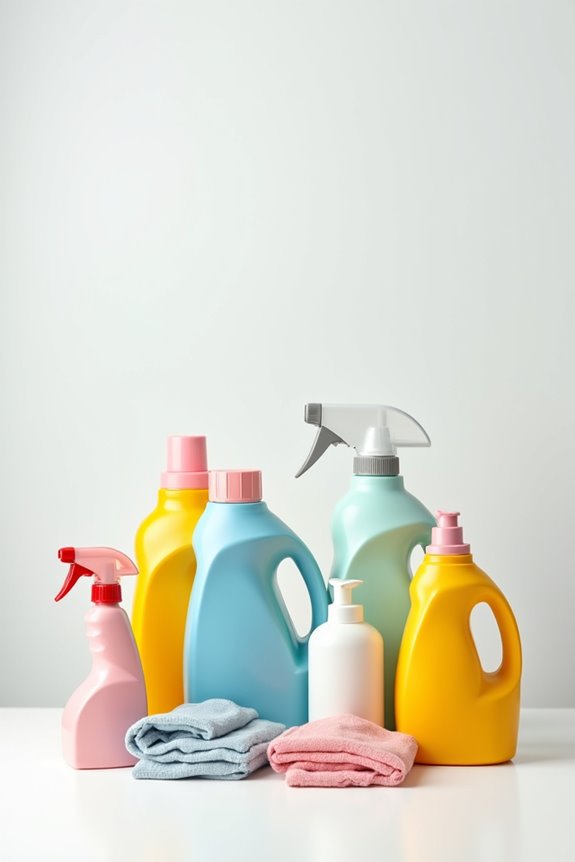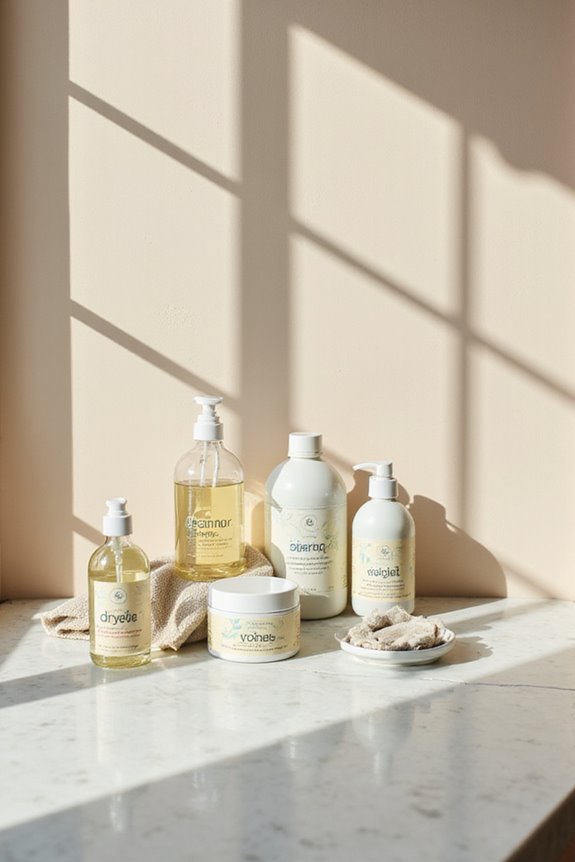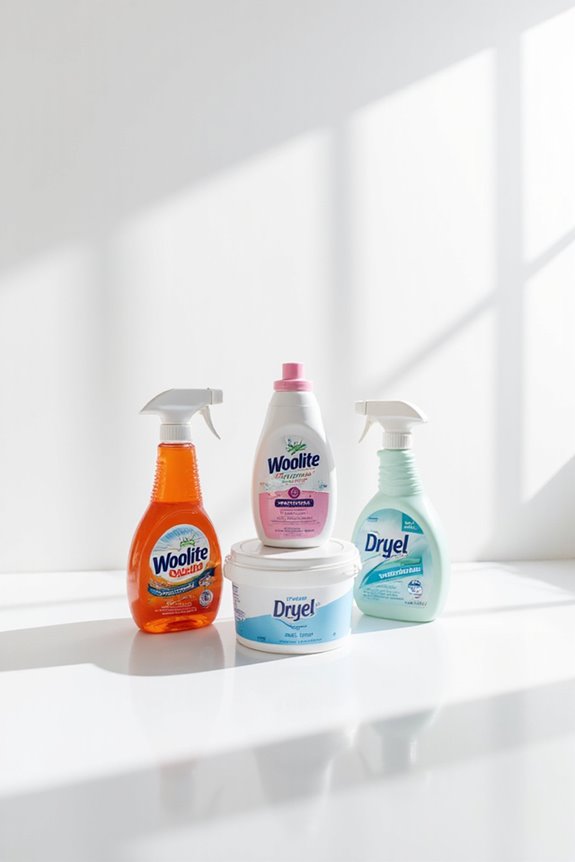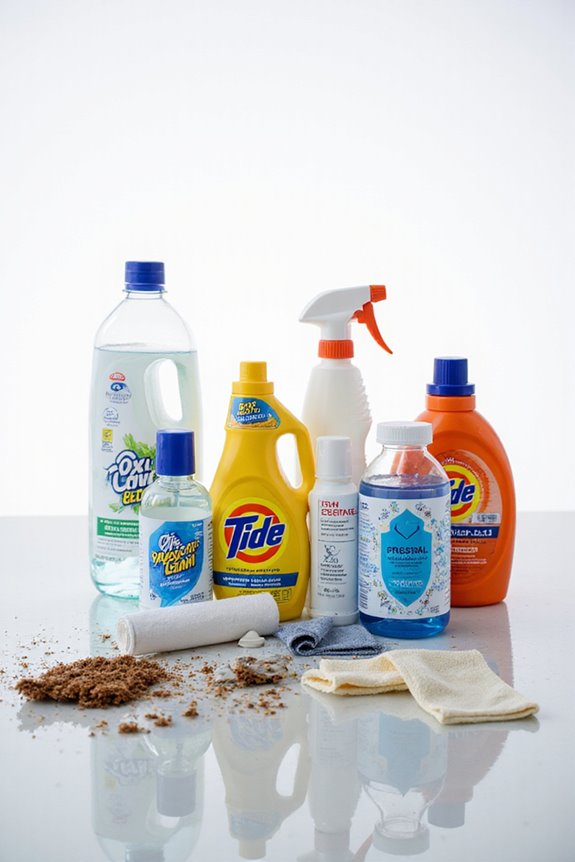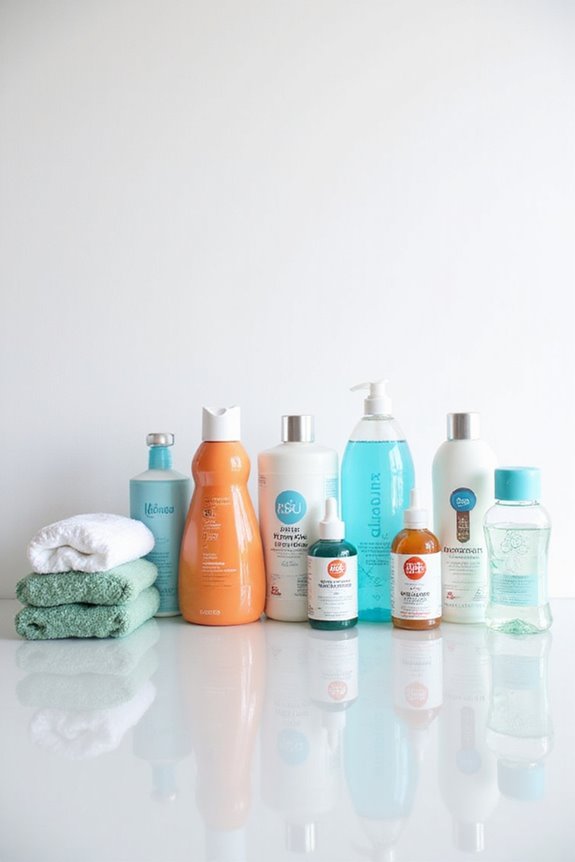When it comes to stain removers, we’ve got to be careful for our pets’ safety. Many conventional cleaners pack harsh chemicals like bleach or ammonia, which can cause serious reactions in our furry friends. Luckily, enzyme-based cleaners are a great pet-friendly option. They break down stains without leaving harmful residues behind. Just remember to check the ingredient labels closely—some “green” products aren’t always safe. Stick around, and we’ll share more tips on keeping your pets safe while cleaning!
Key Takeaways
- Many conventional stain removers contain toxic substances like bleach and ammonia, which pose serious risks to pets’ health.
- Enzyme-based cleaners are generally safe for pets, effectively breaking down stains without leaving harmful residues.
- Read labels carefully; avoid vague terms like “fragrance” as they may hide harmful ingredients like phthalates.
- Always check for ingredient transparency to identify potential allergens and harmful substances before using cleaning products.
- Monitor pets for any allergic reactions post-cleaning and opt for products with recognized safety seals for added assurance.
Understanding Pet-Safe Ingredients
When it comes to keeping our homes clean and safe for our furry friends, understanding pet-safe ingredients is key. We’ve found that natural cleaning products using enzymes—like protease and amylase—effectively tackle those pesky stains without harsh chemicals. These enzymes break down messes like urine and vomit, which is a relief! Plus, many formulations include plant-based and organic ingredients, so we’re not just cleaning, we’re being eco-friendly. The pleasant scents from botanical extracts make cleaning feel less like a chore. And let’s not forget probiotics! They’re great for maintaining a healthy environment. When we choose products with careful ingredient sourcing, we’re ensuring our pets are safe and our homes stay fresh. So, let’s clean smart! Additionally, opting for eco-friendly detergents ensures a lower environmental impact while keeping our pets safe.
The Risks of Harsh Chemicals
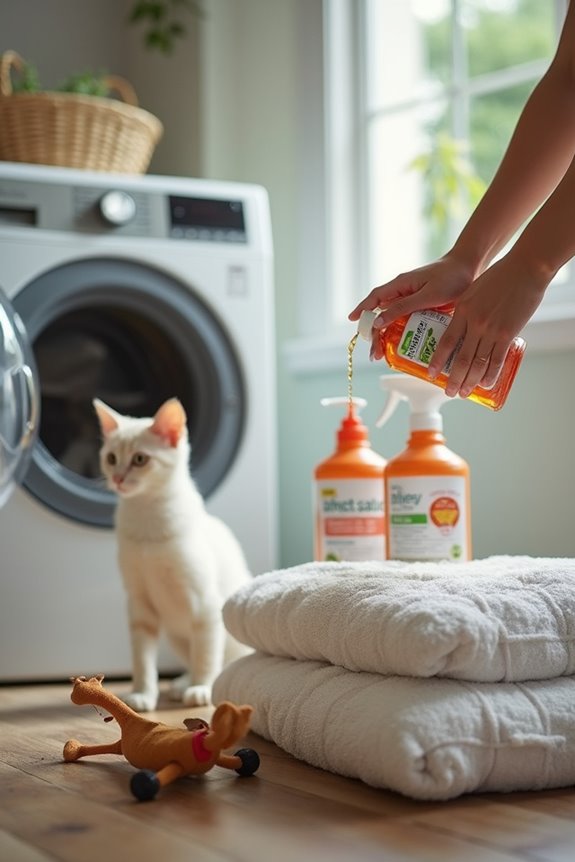
Keeping our homes clean shouldn’t come at the cost of our pets’ safety. Harsh chemicals in many cleaning products pose serious risks. For instance, bleach can cause vomiting and irritate our pets’ noses. Ammonia? It’s no picnic either, irritating their eyes and skin. Even something like isopropyl alcohol can lead to skin irritation or worse if ingested. Let’s face it, our furry friends often lick their paws or groom themselves after we clean, which can lead to harmful chemical exposure. We might think we’re doing safe cleaning, but those “fresh” scents can actually contribute to indoor air pollution, making it harder for our pets to breathe. Choosing eco-friendly formulas can provide effective cleaning while ensuring the safety of our beloved pets. So, let’s choose safer alternatives for everyone’s well-being!
Benefits of Enzyme-Based Cleaners
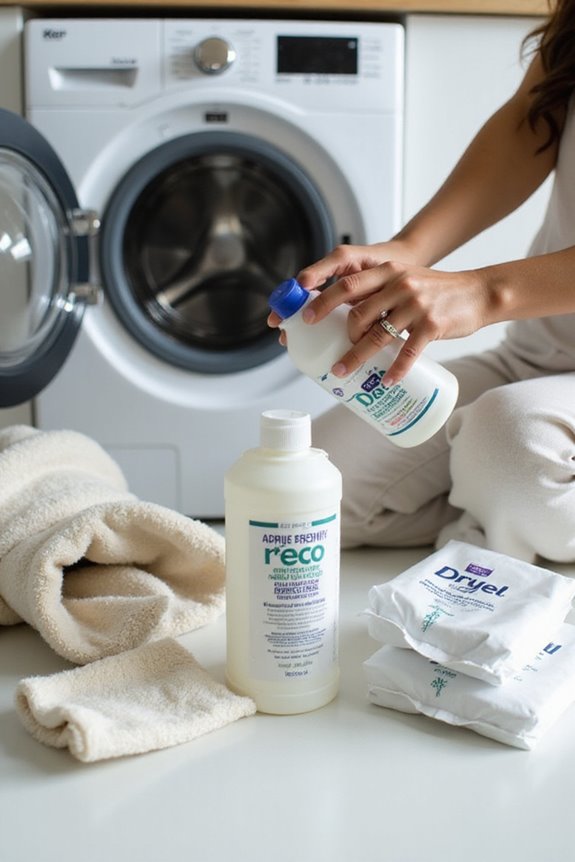
Enzyme-based cleaners offer a fantastic solution for tackling pet messes, especially since they work at the molecular level to break down stains and odors. These cleaners utilize targeted enzymes produced by non-pathogenic bacteria, ensuring enzyme effectiveness in stain elimination. Unlike traditional cleaners that merely mask smells, enzyme cleaners destroy the organic molecules responsible for those pesky odors, like uric acid from pet urine. We’ve seen firsthand how they work wonders on carpets and upholstery, leaving no residue behind. Plus, they’re safe for our furry friends! Using them means we’re not just cleaning up; we’re preventing future accidents by eliminating the biological markers that attract pets back to the same spot. It’s a win-win! Additionally, enzyme-based cleaners effectively break down organic stains without harmful chemicals, making them an excellent choice for pet owners.
Recognizing Toxic Substances in Stain Removers
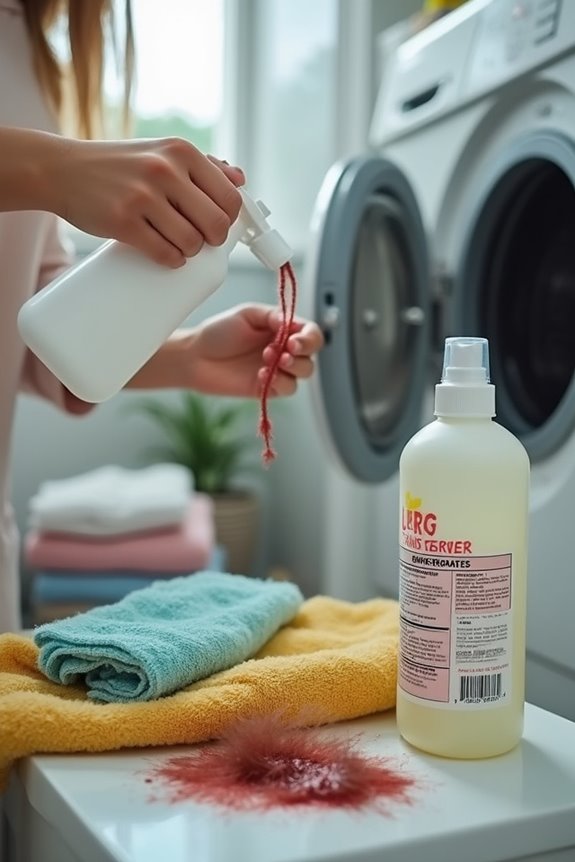
It’s surprising how many common stain removers contain toxic substances that can harm our pets. We often overlook toxic indicators while cleaning, but ingredient labels reveal some shocking truths. For instance, bleach and ammonia are frequent culprits. Products like Lysol and Windex not only clean but can cause serious harm if ingested or inhaled by our furry friends. Phthalates, hiding under “fragrance,” might make our cleaners smell nice, but they’re linked to serious health issues. Even “green” labeled products might contain harmful glycol ethers. By carefully reading labels and steering clear of these substances, we can help keep our pets safe. Additionally, many stain removers contain enzyme-based formulas that may not be safe for pets if ingested. Let’s be vigilant for their sake, because a clean home shouldn’t come at a cost to their health!
Importance of Ingredient Transparency
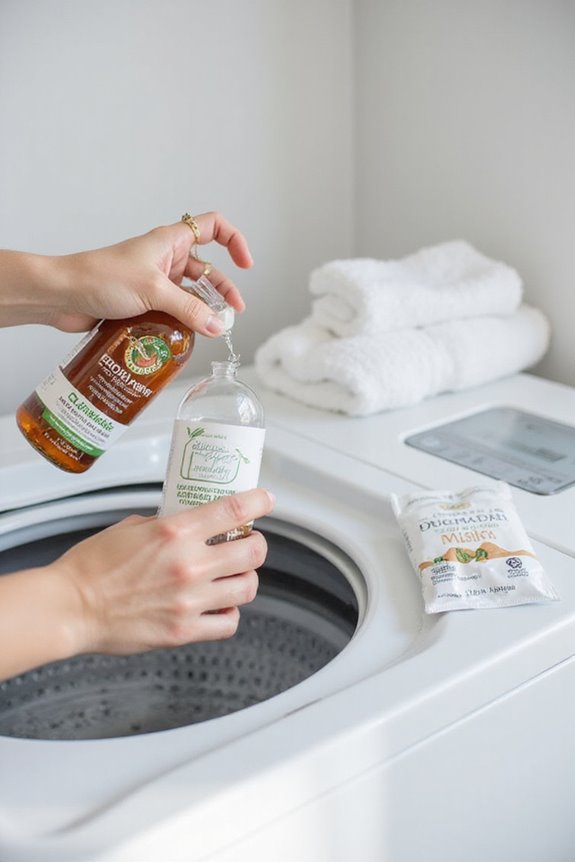
When we think about keeping our homes clean, ingredient transparency in stain removers often gets overlooked. We all want to trust the products we use, especially when pets are involved. Clear ingredient labeling helps us identify harmful substances before we spray and scrub. It’s essential to avoid vague terms like “fragrance” or “surfactant.” By knowing exactly what’s in our cleaners, we can make informed choices that support our pets’ health. This transparency not only reduces the risk of allergic reactions but also encourages better ingredient sourcing. With consumer education on our side, we can hold manufacturers accountable for safety claims. Additionally, opting for eco-friendly ingredients in cleaning products can further ensure the safety of our furry companions. Let’s empower ourselves to choose products that keep our homes clean and our furry friends safe!
Eco-Friendly Alternatives for Pet Owners
Finding safe and effective stain removers can feel like a scavenger hunt, especially for pet owners. Luckily, eco-friendly alternatives exist that make natural cleaning simple. We can use products with USDA certified organic ingredients, like purified water and chamomile extract, to tackle those pesky pet stains without harsh chemicals. Additionally, many eco-friendly products utilize biodegradable ingredients, ensuring a safer environment for both pets and the planet. Homemade solutions, combining vinegar and baking soda, can also work wonders. Plus, these non-toxic options are safe for our furry friends and won’t leave harmful residues behind.
Market Trends in Pet Stain Removers
The pet stain remover market is booming, with projections showing it could reach around USD 15 billion by 2035. This growth reflects a shift in consumer preferences, as more people view their pets as family members. We’re seeing a rise in demand for high-quality, pet-safe products that are easy to use. Convenience is key; multi-purpose cleaners are becoming favorites because they save us time. Plus, as pet ownership increases, especially in urban areas, companies are innovating with hypoallergenic and eco-friendly options. It’s clear that pet owners are willing to spend more on cleaning solutions that prioritize safety and effectiveness. So, whether it’s a stubborn stain or an unpleasant odor, we’re covered with great choices!
Leading Brands for Pet-Safe Products
As we explore the world of pet-safe stain removers, it’s clear that several brands stand out in this growing market. Only Natural Pet shines with its non-toxic, organic bio-enzyme blend, perfect for carpets and upholstery. Nature’s Miracle has been trusted for over 35 years, though their pet-safe certifications could be clearer. In our stain remover comparisons, Biokleen Bac-Out gets mixed grades from B to F, showing variability in safety. Simple Green is popular, but its pet-safe options aren’t specified. We also like Anti-Icky-Poo for its effective odor elimination. Remember, we always want to choose products that prioritize our furry friends’ safety while tackling those pesky stains!
Health Risks of Non-Pet-Safe Stain Removers
When it comes to cleaning up after our pets, we might not think twice about the products we use. However, many non-pet-safe stain removers contain toxic chemicals like bleach and ammonia. These can lead to toxic exposure, causing symptoms like drooling, vomiting, or even seizures in our furry friends. Pets can also develop skin irritations or respiratory issues from inhaling VOCs or contacting residues. Plus, strong cleaners might leave behind dangerous traces that can worsen allergies in sensitive pets. We all want a clean home, but it’s essential to choose safer options. After all, a happy pet means a happy home, right? Let’s keep our cleaning safe for those we love most!
Regulatory Considerations for Pet Cleaning Products
Steering through the world of pet cleaning products can feel like a maze, especially with so many regulations in play. We’ve got the FDA, EPA, and FTC watching over us, ensuring these products are safe. It’s essential for manufacturers to meet regulatory compliance, which means submitting safety data and ingredient labeling that actually makes sense. Many labels are vague, mentioning “Vegetable Surfactants” without specifics. We pet owners should look for those labels that indicate compliance, like the EPA Safer Choice seal. Remember, not all products safe for dogs are safe for cats, so always check. It’s best to stay informed about these regulations; they help us keep our furry friends safe while we tackle those pesky stains!
Frequently Asked Questions
Can Pets Safely Be Around Freshly Cleaned Areas?
When we’ve cleaned areas, it’s essential to take into account pet sensitivity to cleaning chemicals. Giving surfaces time to dry and ensuring ventilation helps keep our furry friends safe from potential irritation or harmful residues.
How Long Should Pets Be Kept Away After Cleaning?
Did you know about 30% of pet owners report their pets acting strangely after cleaning? We should keep our pets away during cleaning duration, as their behavior can change due to lingering fumes or residues.
Are Homemade Stain Removers Safe for Pets?
When considering homemade stain removers, we should note that natural ingredients like vinegar and baking soda offer cleaning effectiveness. However, we must guarantee these solutions are safe for our pets by using them responsibly.
Do Pet-Safe Stain Removers Work on All Surfaces?
Don’t we all want the best for our homes? While pet-safe stain removers excel on many surfaces, their effectiveness depends on compatibility and stain type. Let’s make certain we choose wisely for ideal results!
What Should I Do if My Pet Ingests a Stain Remover?
If our pet ingests a stain remover, we should act quickly. We need to flush their mouth with water and contact a vet for emergency response and veterinary advice to guarantee their safety and health.

